Fleurs du Mal Magazine


Or see the index
In the period between 1815 and 1820, Mary Shelley wrote her most famous novel, Frankenstein; or, The Modern Prometheus, as well as its companion piece, Mathilda, a tragic incest narrative that was confiscated by her father, William Godwin, and left unpublished until 1959. She also gave birth to four—and lost three—children.
 In this hybrid text, Rachel Feder interprets Frankenstein and Mathilda within a series of provocative frameworks including Shelley’s experiences of motherhood and maternal loss, twentieth-century feminists’ interests in and attachments to Mary Shelley, and the critic’s own experiences of pregnancy, childbirth, and motherhood.
In this hybrid text, Rachel Feder interprets Frankenstein and Mathilda within a series of provocative frameworks including Shelley’s experiences of motherhood and maternal loss, twentieth-century feminists’ interests in and attachments to Mary Shelley, and the critic’s own experiences of pregnancy, childbirth, and motherhood.
Harvester of Hearts explores how Mary Shelley’s exchanges with her children—in utero, in birth, in life, and in death—infuse her literary creations. Drawing on the archives of feminist scholarship, Feder theorizes “elective affinities,” a term she borrows from Goethe to interrogate how the personal attachments of literary critics shape our sense of literary history.
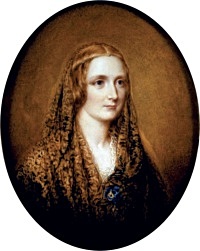 Feder blurs the distinctions between intellectual, bodily, literary, and personal history, reanimating the classical feminist discourse on Frankenstein by stepping into the frame.
Feder blurs the distinctions between intellectual, bodily, literary, and personal history, reanimating the classical feminist discourse on Frankenstein by stepping into the frame.
The result—at once an experimental book of literary criticism, a performative foray into feminist praxis, and a deeply personal lyric essay—not only locates Mary Shelley’s monsters within the folds of maternal identity but also illuminates the connections between the literary and the quotidian.
Rachel Feder is an assistant professor of English and literary arts at the University of Denver. Her scholarly and creative work has appeared in a range of publications including ELH, Studies in Romanticism, and a poetry chapbook from dancing girl press.
Rachel Feder (Author)
Harvester of Hearts
Motherhood under the Sign of Frankenstein
Cloth Text – $99.95
ISBN 978-0-8101-3753-0
Paper Text – $34.95
ISBN 978-0-8101-3752-3
August 2018
Women’s Studies
Literary Criticism
152 pages
Northwestern University Press
new books
fleursdumal.nl magazine
More in: - Book News, - Book Stories, Archive E-F, Archive S-T, Art & Literature News, Mary Shelley, Shelley, Mary, Shelley, Percy Byssche, Tales of Mystery & Imagination
Het Fries Museum haalt M.C. Escher terug naar zijn geboortestad Leeuwarden. In Escher op reis (28 april t/m 28 oktober 2018) volg je zijn ontwikkeling van grafisch talent tot wereldberoemd kunstenaar.
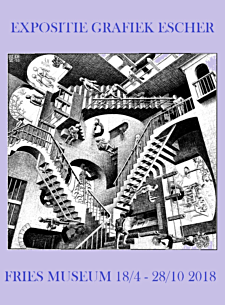 Met meer dan tachtig originele prenten, circa twintig tekeningen en diverse foto’s en voorwerpen treed je in de voetsporen van de reislustige graficus, die in Italië, Zwitserland en Spanje inspiratie vond voor zijn bekendste werken.
Met meer dan tachtig originele prenten, circa twintig tekeningen en diverse foto’s en voorwerpen treed je in de voetsporen van de reislustige graficus, die in Italië, Zwitserland en Spanje inspiratie vond voor zijn bekendste werken.
De reis begint in het grauwe platte Nederland en voert je mee naar de zon en de bergen van de Méditerranée. Eschers reislust blijkt bepalend voor zijn artistieke ontwikkeling. De schetsen die hij onderweg maakte, zijn de inspiratie voor de topstukken waarin hij jaren later de werkelijkheid naar zijn hand zette. De tentoonstelling eindigt met deze iconische werken die Escher zo bekend en geliefd maken.
Maurits Cornelis Escher (1898-1972) werd geboren in het stadspaleis van Leeuwarden, waar tegenwoordig Keramiekmuseum Princessehof gevestigd is. Na zijn studie trok Escher de wijde wereld in.
Hij verhuisde naar Italië, waar hij gelukkige en productieve jaren beleefde. Op een ezel trok hij de bergen in om charmante dorpjes en karakteristieke vergezichten vast te leggen. Zodra het donker werd bond hij een zaklampje aan zijn knoopsgat en schetste hij de aanblik van Rome bij nacht.
 De prenten uit deze periode verraden Eschers fascinatie voor opvallende perspectieven en beeldcompilaties. Na omzwervingen langs Zwitserland en België belandde hij uiteindelijk in Baarn. Daar verwerkte Escher zijn mediterraanse indrukken tot complexe beelden en onmogelijke werelden. Aan het einde van Eschers reis laat hij met topstukken als Belvédère (1958) en Metamorphose II (1939-1940) niet alleen zijn technische kunnen en wiskundige trucjes zien; wie goed kijkt ontdekt ook zijn voorliefde voor het Italiaanse landschap.
De prenten uit deze periode verraden Eschers fascinatie voor opvallende perspectieven en beeldcompilaties. Na omzwervingen langs Zwitserland en België belandde hij uiteindelijk in Baarn. Daar verwerkte Escher zijn mediterraanse indrukken tot complexe beelden en onmogelijke werelden. Aan het einde van Eschers reis laat hij met topstukken als Belvédère (1958) en Metamorphose II (1939-1940) niet alleen zijn technische kunnen en wiskundige trucjes zien; wie goed kijkt ontdekt ook zijn voorliefde voor het Italiaanse landschap.
Het jaar dat Leeuwarden Culturele Hoofdstad van Europa is, staat het Fries Museum in het teken van Escher. Naast Escher op reis, presenteert het museum het hele jaar de tentoonstelling Phantom Limb: art beyond Escher. Met indrukwekkende installaties zetten hedendaagse (inter)nationale kunstenaars je op het verkeerde been. Ze scheppen een wereld waarin niets is wat het lijkt, net zoals Escher dat deed. Bovendien daagt het museum mensen uit om zich te laten inspireren door de wereldberoemde graficus. De uiteenlopende projecten worden samengebracht op # website planeetescher.nl
m.c. escher
escher op reis
Nog t/m 28 oktober 2018
Fries Museum – leeuwarden
publicatie bij ‘escher op reis’
fries museum brengt rijk geïllustreerd escherboek uit
Bij de grootschalige tentoonstelling Escher op reis verschijnt een tweetalige publicatie in het Nederlands en Engels. Net als in de tentoonstelling volg je in het boek de reizen van de wereldberoemde graficus M.C. Escher, die een bepalende invloed hadden op zijn persoonlijke en artistieke ontwikkeling. De catalogus bevat alle prenten die te zien zijn in Escher op reis en kost 29,95 euro. Het boek wordt uitgegeven door het Fries Museum in samenwerking met de M.C. Escher Stichting, Maurits S.r.l. en WBOOKS.
Escher op reis – Escher’s Journey
Federico Giudiceandrea
In samenwerking met het Fries Museum
Tentoonstelling t/m 28 oktober 2018
ISBN 978 94 625 8275 0
Aantal pagina’s 186
Formaat 20 x 25 cm
Illustraties ca. 100 afbeeldingen kleur
Uitvoering Hardback
WBooks – 2018
Taal Engels, Nederlands
Wbooks – € 29,95
Exhibition M.C. Escher in Fries Museum
new books
fleursdumal.nl magazine
More in: - Book News, Archive E-F, Art & Literature News, Exhibition Archive, Illustrators, Illustration, M.C. Escher
Just in time for his 99th birthday, New Directions is proud to present a swift, terrific chronological selection of Lawrence Ferlinghetti’s greatest poems.
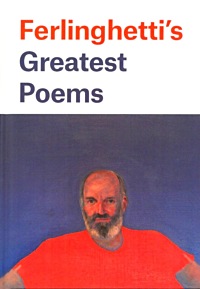 Through this tight lens, it is now possible to see Ferlinghetti—a brilliant and prolific poet—in a richer, broader, and more complex way. From his very first landmark books—Pictures of the Gone World (City Lights, 1955) and A Coney Island of the Mind (New Directions, 1958)—to new work, Ferlinghetti’s Greatest Poems displays every stage of this multifaceted writer’s long and celebrated career. It’s exciting to revisit in one slender volume so much of the splendid, playful, and trenchant work of one of America’s greatest and most popular poets.
Through this tight lens, it is now possible to see Ferlinghetti—a brilliant and prolific poet—in a richer, broader, and more complex way. From his very first landmark books—Pictures of the Gone World (City Lights, 1955) and A Coney Island of the Mind (New Directions, 1958)—to new work, Ferlinghetti’s Greatest Poems displays every stage of this multifaceted writer’s long and celebrated career. It’s exciting to revisit in one slender volume so much of the splendid, playful, and trenchant work of one of America’s greatest and most popular poets.
“A brave man and a brave poet.”––Bob Dylan
Lawrence Ferlinghetti, poet and founder of City Lights Books, author of A Coney Island of the Mind and Pictures of the Gone World, among numerous other books, has been drawing from life since his student days in Paris where he frequented the Academie Julien and where he did his first oil painting.
“Lawrence gets you laughing and then hits you with the truth.”––Francis Ford Coppola
Title: Ferlinghetti’s Greatest Poems
Author: Lawrence Ferlinghetti
Edited by Nancy J. Peters
Publisher New Directions Publishing Corporation
Format Hardcover, $16.95
144 pp.
ISBN-10 081122712X
ISBN-13 9780811227124
Publication Date 21 November 2017
new poetry books
fleursdumal.nl magazine
More in: #Beat Generation Archives, - Book News, - Bookstores, Archive E-F, Archive E-F, Art & Literature News
Wie Elsschot zegt, denkt niet meteen aan poëzie. Toch zijn het juist enkele van zijn dichtregels die iedereen zal herkennen: ‘tussen droom en daad staan wetten in de weg en praktische bezwaren’, bijvoorbeeld. Willem Elsschot. Dichter bevat alle gedichten uit Elsschots enige bundel.
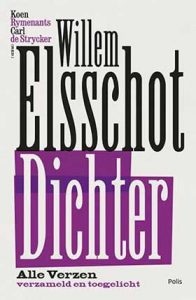 Een select gezelschap van vijfentwintig scherpzinnige lezers geeft er commentaar bij, aangevoerd door Elsschotkenner Koen Rymenants en poëzie-expert Carl de Strycker. Ze verhelderen Elsschots proza met behulp van zijn poëzie en omgekeerd. Ze tonen ons Elsschot als gelegenheidsdichter en -vertaler en brengen onvermoede verwantschappen aan het licht: met Guido Gezelle en de gezusters Loveling, de Bijbel en Victor Hugo, maar ook met Herman de Coninck en Kees van Kooten.
Een select gezelschap van vijfentwintig scherpzinnige lezers geeft er commentaar bij, aangevoerd door Elsschotkenner Koen Rymenants en poëzie-expert Carl de Strycker. Ze verhelderen Elsschots proza met behulp van zijn poëzie en omgekeerd. Ze tonen ons Elsschot als gelegenheidsdichter en -vertaler en brengen onvermoede verwantschappen aan het licht: met Guido Gezelle en de gezusters Loveling, de Bijbel en Victor Hugo, maar ook met Herman de Coninck en Kees van Kooten.
Koen Rymenants (1977) promoveerde op een proefschrift over Elsschot: Een hoopje vuil in de feestzaal. Facetten van het proza van Willem Elsschot (2009). Hij publiceert over literatuur en is bestuurslid van het Willem Elsschot Genootschap.
Carl de Strycker (1981) is directeur van Poëziecentrum en hoofdredacteur van Poëziekrant. Met Yra van Dijk en Maarten De Pourcq stelde hij het boek Draden in het donker. Intertekstualiteit in theorie en praktijk (2013) samen
Willem Elsschot. Dichter
Auteur(s): Carl De Strycker, Koen Rymenants
ISBN 978-94-6310-290-2
Paperback
Formaat 140 x 215
Aantal pagina’s 304
Publicatiedatum 5 okt. 2017
€ 22,50
Pelckmans uitgevers
new books
fleursdumal.nl magazine
More in: - Book News, - Book Stories, Archive E-F, Archive E-F, Art & Literature News, Willem Elsschot
Van onzen correspondent bevat de artikelen die Willem Elsschot in de jaren 1918-1922 schreef voor de Nieuwe Rotterdamsche Courant. Ze zijn bijeengezocht en van een geschiedenis voorzien door C.J. Aarts en M.C. van Etten.
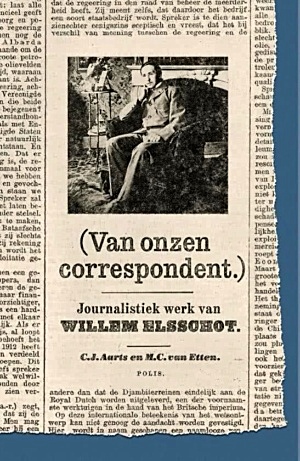 Bijna niemand weet dat Willem Elsschot kort na de Eerste Wereldoorlog een paar jaar de Antwerpse correspondent van de Nieuwe Rotterdamsche Courant was. Elsschot brengt nuchter verslag uit, maar laat zijn sarcastisch commentaar niet achterwege.
Bijna niemand weet dat Willem Elsschot kort na de Eerste Wereldoorlog een paar jaar de Antwerpse correspondent van de Nieuwe Rotterdamsche Courant was. Elsschot brengt nuchter verslag uit, maar laat zijn sarcastisch commentaar niet achterwege.
Terwijl Antwerpen herrijst, heeft Elsschot een scherp oog voor alle ellende van de bevolking: de woningnood, de voedselschaarste, de afbladderende verf, de werkloosheid. Bovenal was Elsschot er zich steeds van bewust dat hij zijn bijdragen aan de Nieuwe Rotterdamsche Courant schreef voor Nederlandse lezers.
C.J. Aarts en M.C. van Etten schetsen in dit prachtig vormgegeven en geïllustreerde boek hun fascinerende zoektocht naar de journalist Willem Elsschot. Van onzen correspondent is dan ook een verrassende aanvulling bij de biografie van deze grote schrijver.
Willem Elsschot (1882–1960) is de beroemde auteur van een klein, maar fijnzinnig literair oeuvre. Zijn journalistiek werk is tot nu toe nauwelijks bekend.
C.J. Aarts (1947) en M.C. van Etten (1948) zijn de samenstellers van de uitgeverijgeschiedenis 175 jaar Nijgh & Van Ditmar (2012) en van een tiental bloemlezingen, waaronder de zeer succesvolle bloemlezing Domweg gelukkig, in de Dapperstraat (1990).
Willem Elsschot, van onzen correspondent
Auteur(s): C.J. Aarts, M.C. van Etten
Hardcover
Formaat 150 x 230
Aantal pagina’s 352
Publicatiedatum 24 nov. 2017
ISBN 978-94-6310-170-7
€ 34,99
Pelckmans uitgevers
new books
fleursdumal.nl magazine
More in: - Book News, - Book Stories, Archive E-F, Archive E-F, Art & Literature News, LITERARY MAGAZINES, PRESS & PUBLISHING, Willem Elsschot
Michel Houellebecq ist nicht nur einer der erfolgreichsten Schriftsteller der Gegenwart, er ist vor allem und mit großer Lust eines: ein Provokateur, der regelmäßig Debatten auslöst, die weit über das Literarische hinausgehen.
 Mal nennt er den Islam die «bescheuertste Religion der Welt», dann preist er die Prostitution als eheerhaltende Maßnahme – und man kann sich nicht sicher sein, ob er das wirklich so meint.
Mal nennt er den Islam die «bescheuertste Religion der Welt», dann preist er die Prostitution als eheerhaltende Maßnahme – und man kann sich nicht sicher sein, ob er das wirklich so meint.
Julia Encke, Literaturchefin der «Frankfurter Allgemeinen Sonntagszeitung», ist ihm immer wieder begegnet und macht sich nun daran, das Leben und Werk dieses großen Dichters zu entschlüsseln. «Wer ist Michel Houellebecq?» fragt nach der Spannung zwischen dem Menschen Houellebecq und dem öffentlichen Bild des Mannes, der mit seinen Romanen «Elementarteilchen» und «Unterwerfung» wütende Anfeindungen wie begeisterte Zustimmung erntete.
Sie beschreibt die vielen Facetten – den Visionär, den Romantiker, den Künstler – und zeigt, dass kaum jemand die Stimmung unserer Zeit so gut erfasst wie Michel Houellebecq. Er zielt mit seinen Texten mitten ins Herz unserer Gesellschaft – weshalb auch kaum jemand eine so große Gemeinde von Fans und erbitterten Gegnern hat. Pünktlich zum 60. Geburtstag erscheint nun das Porträt, das dem Rätsel Houellebecq auf die Spur zu kommen versucht.
Julia Encke, geboren 1971, studierte Literaturwissenschaft in Freiburg, Toulouse und München und promovierte mit einer vielbeachteten Arbeit über den Ersten Weltkrieg. Von 2001 bis 2005 arbeitete sie im Feuilleton der «Süddeutschen Zeitung» und gehört seit Sommer 2005 dem Feuilleton der «Frankfurter Allgemeinen Sonntagszeitung» in Berlin an. Seit 2015 verantwortet sie dort das Literaturressort. 2005 erschien «Augenblicke der Gefahr. Der Krieg und die Sinne 1914–1934», 2014 «Charisma und Politik. Warum unsere Demokratie mehr Leidenschaft braucht».
Julia Encke:
Wer ist Michel Houellebecq?
Porträt eines Provokateurs
Dec. 2017
256 Seiten
€19,95
Hardcover
ISBN: 978-3-7371-0017-5
Verlag: Rowohlt Berlin
new books
fleursdumal.nl magazine
More in: - Book Lovers, - Book Stories, Archive E-F, Archive G-H, Art & Literature News, Michel Houellebecq, NONFICTION: ESSAYS & STORIES
Peu de noms évoquent autant le mystère, la sensualité et l’intrigue que celui de Mata Hari. Son histoire est vraie, mais elle comporte tous les ingrédients d’un grand film d’aventure : ambition, argent, sexe, pouvoir et mort tragique…
 Mère de famille, danseuse nue, espionne et femme fatale, Mata Hari a traversé plusieurs vies avant d’accéder au rang de personnage légendaire. Fusillée en 1917, elle a continué de vivre dans l’imaginaire collectif, devenant un mythe dont se sont emparés le cinéma et la publicité.
Mère de famille, danseuse nue, espionne et femme fatale, Mata Hari a traversé plusieurs vies avant d’accéder au rang de personnage légendaire. Fusillée en 1917, elle a continué de vivre dans l’imaginaire collectif, devenant un mythe dont se sont emparés le cinéma et la publicité.
Première star mondiale, dont le nom sonne comme une marque, elle a inventé le strip-tease, créé un style vestimentaire et inauguré l’ère du renseignement technologique, puisque ce sont les interceptions de la tour Eiffel qui ont Iivré les secrets de l’«agent H 21». Une histoire folle d’une grande modernité.
À partir des archives de la Défense et d’une abondante documentation, Bruno Fuligni révèle la captivante histoire d’une vie faite d’amour, de mensonges et de subterfuges, la vie d’une femme dont le nom est devenu le symbole de l’espionnage au féminin.
Bruno Fuligni
Mata Hari. Les vies insolentes de l’agent H 21
Albums hors série, Gallimard Loisirs
Parution : 12-10-2017
192 pages, ill.,
sous couverture illustrée,
195 x 255 mm, cartonné
Genre : Albums illustrés Thème : histoire
Sous-thème : Temps présent (1914 – XXe s.)
ISBN : 9782742448012
Gencode : 9782742448012
Prix €35,00
new books
fleursdumal.nl magazine
More in: - Book News, - Book Stories, Archive E-F, Art & Literature News, CRIME & PUNISHMENT, FDM in Paris, Mata Hari, WAR & PEACE
The second installment in Jasper Fforde’s New York Times bestselling series follows literary detective Thursday Next on another adventure in her alternate reality of literature-obsessed England.
 The inventive, exuberant, and totally original literary fun that began with The Eyre Affair continues with New York Times bestselling author Jasper Fforde’s magnificent second adventure starring the resourceful, fearless literary sleuth Thursday Next.
The inventive, exuberant, and totally original literary fun that began with The Eyre Affair continues with New York Times bestselling author Jasper Fforde’s magnificent second adventure starring the resourceful, fearless literary sleuth Thursday Next.
When Landen, the love of her life, is eradicated by the corrupt multinational Goliath Corporation, Thursday must moonlight as a Prose Resource Operative of Jurisfiction—the police force inside the BookWorld. She is apprenticed to the man-hating Miss Havisham from Dickens’s Great Expectations, who grudgingly shows Thursday the ropes. And she gains just enough skill to get herself in a real mess entering the pages of Poe’s “The Raven.” What she really wants is to get Landen back.
But this latest mission is not without further complications. Along with jumping into the works of Kafka and Austen, and even Beatrix Potter’s The Tale of the Flopsy Bunnies, Thursday finds herself the target of a series of potentially lethal coincidences, the authenticator of a newly discovered play by the Bard himself, and the only one who can prevent an unidentifiable pink sludge from engulfing all life on Earth. It’s another genre-bending blend of crime fiction, fantasy, and top-drawer literary entertainment for fans of Douglas Adams and P. G. Wodehouse.
Thursday’s zany investigations continue with The Well of Lost Plots. Look for the five other bestselling Thursday Next novels, including One of Our Thursdays is Missing and Jasper Fforde’s latest bestseller, The Woman Who Died A Lot. Visit website jasperfforde.com for a full window into the Ffordian world!
Jasper Fforde traded a varied career in the film industry for staring vacantly out the window and arranging words on a page. He lives and writes in Wales. The Eyre Affair was his first novel in the bestselling Thursday Next series. He is also the author of Shades of Grey and the Nursery Crime series.
Lost in a Good Book
A Thursday Next Novel
By Jasper Fforde
Part of A Thursday Next Novel
Category: Mystery & Suspense | Literary Fiction | Contemporary Fantasy
Paperback
2004 – 432 Pages
Penguin Random House
fleursdumal.nl magazine
More in: - Book News, - Bookstores, Archive E-F, Art & Literature News
Wie Elsschot zegt, denkt niet meteen aan poëzie. Toch zijn het juist enkele van zijn dichtregels die iedereen zal herkennen: ‘tussen droom en daad staan wetten in de weg en praktische bezwaren’, bijvoorbeeld. Willem Elsschot. Dichter bevat alle gedichten uit Elsschots enige bundel.
 Een select gezelschap van vijfentwintig scherpzinnige lezers geeft er commentaar bij, aangevoerd door Elsschotkenner Koen Rymenants en poëzie-expert Carl de Strycker. Ze verhelderen Elsschots proza met behulp van zijn poëzie en omgekeerd. Ze tonen ons Elsschot als gelegenheidsdichter en -vertaler en brengen onvermoede verwantschappen aan het licht: met Guido Gezelle en de gezusters Loveling, de Bijbel en Victor Hugo, maar ook met Herman de Coninck en Kees van Kooten.
Een select gezelschap van vijfentwintig scherpzinnige lezers geeft er commentaar bij, aangevoerd door Elsschotkenner Koen Rymenants en poëzie-expert Carl de Strycker. Ze verhelderen Elsschots proza met behulp van zijn poëzie en omgekeerd. Ze tonen ons Elsschot als gelegenheidsdichter en -vertaler en brengen onvermoede verwantschappen aan het licht: met Guido Gezelle en de gezusters Loveling, de Bijbel en Victor Hugo, maar ook met Herman de Coninck en Kees van Kooten.
Koen Rymenants (1977) promoveerde op een proefschrift over Elsschot: Een hoopje vuil in de feestzaal. Facetten van het proza van Willem Elsschot (2009). Hij publiceert over literatuur en is bestuurslid van het Willem Elsschot Genootschap.
Carl de Strycker (1981) is directeur van Poëziecentrum en hoofdredacteur van Poëziekrant. Met Yra van Dijk en Maarten De Pourcq stelde hij het boek Draden in het donker. Intertekstualiteit in theorie en praktijk (2013) samen.
Willem Elsschot. Dichter
Koen Rymenants, Carl De Strycker
Paperback
ISBN 978-94-6310-290-2
€ 22,50
Paperback
Formaat 140 x 215
Aantal pagina’s 304
Publicatiedatum 5 okt. 2017
Uitg. Polis Antwerpen
fleursdumal.nl magazine
More in: - Book News, - Book Stories, Archive E-F, Archive E-F, Art & Literature News, Willem Elsschot
Over the past few decades there has been a revolution in terms of who controls knowledge and information.
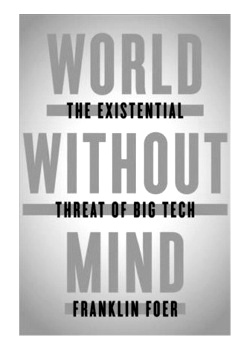 This rapid change has imperiled the way we think. Without pausing to consider the cost, the world has rushed to embrace the products and services of four titanic corporations. We shop with Amazon; socialize on Facebook; turn to Apple for entertainment; and rely on Google for information. These firms sell their efficiency and purport to make the world a better place, but what they have done instead is to enable an intoxicating level of daily convenience.
This rapid change has imperiled the way we think. Without pausing to consider the cost, the world has rushed to embrace the products and services of four titanic corporations. We shop with Amazon; socialize on Facebook; turn to Apple for entertainment; and rely on Google for information. These firms sell their efficiency and purport to make the world a better place, but what they have done instead is to enable an intoxicating level of daily convenience.
As these companies have expanded, marketing themselves as champions of individuality and pluralism, their algorithms have pressed us into conformity and laid waste to privacy. They have produced an unstable and narrow culture of misinformation, and put us on a path to a world without private contemplation, autonomous thought, or solitary introspection–a world without mind. In order to restore our inner lives, we must avoid being coopted by these gigantic companies, and understand the ideas that underpin their success.
Elegantly tracing the intellectual history of computer science–from Descartes and the enlightenment to Alan Turing to Stuart Brand and the hippie origins of today’s Silicon Valley–Foer exposes the dark underpinnings of our most idealistic dreams for technology. The corporate ambitions of Google, Facebook, Apple, and Amazon, he argues, are trampling longstanding liberal values, especially intellectual property and privacy. This is a nascent stage in the total automation and homogenization of social, political, and intellectual life. By reclaiming our private authority over how we intellectually engage with the world, we have the power to stem the tide.
At stake is nothing less than who we are, and what we will become. There have been monopolists in the past but today’s corporate giants have far more nefarious aims. They’re monopolists who want access to every facet of our identities and influence over every corner of our decision-making. Until now few have grasped the sheer scale of the threat. Foer explains not just the looming existential crisis but the imperative of resistance.
Franklin Foer is a national correspondent for The Atlantic and a fellow at the New America Foundation. He is the author of How Soccer Explains the World, which has been translated into 27 languages and a winner of a National Jewish Book Award. For seven years, he edited The New Republic magazin
Franklin Foer:
World Without Mind.
The Existential Threat of Big Tech
Hardcover
272 pages
Published September 2017
Penguin Press
ISBN 1101981113
ISBN13: 9781101981115
World Without Mind: The Existential Threat of Big Tech by Franklin Foer . Franklin Foer reveals the existential threat posed by big tech, and in his brilliant polemic gives us the toolkit to fight their pervasive influence.
fleursdumal.nl magazine
More in: - Book Stories, - Bookstores, Archive E-F, Art & Literature News, AUDIO, CINEMA, RADIO & TV, DICTIONARY OF IDEAS, MONTAIGNE, The Art of Reading, The talk of the town
February 9, 1942. Disgraced Southern cop Woodrow Cain arrives in New York City for a new position with the NYPD and is greeted with smoke billowing out from the SS Normandie, engulfed in flames on the Hudson.
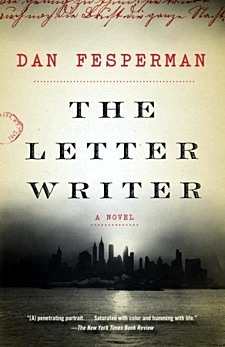 On Cain’s first day on the job, a body turns up in the same river. Unfamiliar with the milieu of mob bosses and crooked officials in the big city, Cain’s investigation stalls, until a strange man who calls himself Danziger enters his life. Danziger looks like a miscreant, but speaks five languages, has the manners of a gentleman, and is the one person who can help Cain identify the body. A letter writer for illiterate European immigrants, Danzinger has a seemingly boundless knowledge of the city’s denizens and networks—and possesses information that extends beyond the reach of his clients, hinting at an unfathomable past. As the body count grows, Cain and Danziger inch closer toward an underground web of possibly traitorous corruption . . . but in these murky depths, not even Danzinger can know what kind of danger will await them.
On Cain’s first day on the job, a body turns up in the same river. Unfamiliar with the milieu of mob bosses and crooked officials in the big city, Cain’s investigation stalls, until a strange man who calls himself Danziger enters his life. Danziger looks like a miscreant, but speaks five languages, has the manners of a gentleman, and is the one person who can help Cain identify the body. A letter writer for illiterate European immigrants, Danzinger has a seemingly boundless knowledge of the city’s denizens and networks—and possesses information that extends beyond the reach of his clients, hinting at an unfathomable past. As the body count grows, Cain and Danziger inch closer toward an underground web of possibly traitorous corruption . . . but in these murky depths, not even Danzinger can know what kind of danger will await them.
ONE OF THE NEW YORK TIMES 10 BEST CRIME NOVELS OF THE YEAR
DAN FESPERMAN‘s travels as a journalist and novelist have taken him to thirty countries and three war zones. Lie in the Dark won the Crime Writers’ Association of Britain’s John Creasey Memorial Dagger Award for best first crime novel, The Small Boat of Great Sorrows won their Ian Fleming Steel Dagger Award for best thriller, and The Prisoner of Guantánamo won the Dashiell Hammett Award from the International Association of Crime Writers.
“Fesperman is a skillful, unpretentious writer who deftly incorporates his extensive knowledge of the period.” Anna Mundow, Boston Globe
The Letter Writer
A Novel
By Dan Fesperman
Category: Historical Fiction
Paperback
384 Pages
Publ.: Mar 21, 2017 |
Penquin Random House
new books
fleursdumal.nl magazine
More in: - Book News, Archive E-F, Art & Literature News, Tales of Mystery & Imagination
« Je n’ai jamais cru à un monde meilleur, mais la violence que nous sommes en train de vivre — en France, en Europe, cette violence-là me tue.
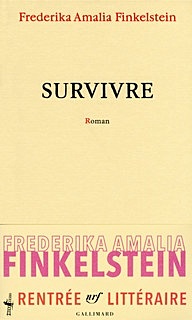 Il est 07 h 44, je suis sur le quai de la station Stalingrad. Une patrouille de quatre militaires vient de s’arrêter à côté de moi. Je ferme les yeux et j’essaye de penser à une chose belle : je revois ma maison d’enfance, son jardin gonflé de fleurs (hortensias, lilas, marguerites), ses volets bleus bordés de rouille et ses murs écaillés par le sel de l’océan. Je rouvre les yeux. L’un des militaires a son fusil calé dans le pli de son coude, le canon orienté vers mon ventre. Il suffit que l’un d’eux soit pris d’un coup de folie et nous voilà tous morts. Je recule d’un mètre. Une odeur de caoutchouc et de métal brûlé envahit la station, suivi d’un son aigu, perçant, produit par le frottement des roues contre les rails. »
Il est 07 h 44, je suis sur le quai de la station Stalingrad. Une patrouille de quatre militaires vient de s’arrêter à côté de moi. Je ferme les yeux et j’essaye de penser à une chose belle : je revois ma maison d’enfance, son jardin gonflé de fleurs (hortensias, lilas, marguerites), ses volets bleus bordés de rouille et ses murs écaillés par le sel de l’océan. Je rouvre les yeux. L’un des militaires a son fusil calé dans le pli de son coude, le canon orienté vers mon ventre. Il suffit que l’un d’eux soit pris d’un coup de folie et nous voilà tous morts. Je recule d’un mètre. Une odeur de caoutchouc et de métal brûlé envahit la station, suivi d’un son aigu, perçant, produit par le frottement des roues contre les rails. »
«Le soir du 13 novembre, j’ai compris que la guerre pouvait éclater en bas de chez moi – une forme inouïe de guerre. La peur et la méfiance sont devenues normales : je vis en attendant le prochain attentat.
Le soir du 13 novembre, ma génération s’en est prise à elle-même : les assassins avaient le même âge que les assassinés.
Survivre est un hommage à cette génération, née avec les écrans, ultraconnectée, et pourtant en proie à une immense solitude.
Nous voulons être libres : parfois pour le meilleur, parfois pour le pire.» Frederika Amalia Finkelstein.
Frederika Amalia Finkelstein
Survivre
Collection L’Arpenteur, Gallimard
Parution : 17-08-2017
144 pages
130 x 215 mm
ISBN : 9782072741241
Prix €14,00
Editions Gallimard
fleursdumal.nl magazine
More in: - Book News, - Book Stories, Archive E-F, Art & Literature News
Thank you for reading Fleurs du Mal - magazine for art & literature